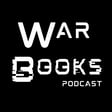
U.S. Civil War - Black Soldiers in the Union Army - David Wright Faladé
Ep 006 - Fiction. My first fiction author on the War Books Podcast! The incredibly talented author David Wright Faladé joined me to discuss his new book, “Black Cloud Rising.”
Black Cloud Rising takes place in 1863, at a time when former slaves joined the newly formed African Brigade to hunt down rebel guerillas & fight against their former owners. I found the novel to be both exciting & complex, and David was a phenomenal guest. Topics included Civil War leadership, the true-life story of his main character Richard Etheridge, and how a scene from the movie “Glory” inspired his vision for this book.
Support independent bookstores & buy David’s book here: https://bookshop.org/a/92235/9780802159199
Subscribe to the War Books podcast here:
YouTube: https://www.youtube.com/@warbookspodcast
Apple: http://bit.ly/3ZCL0du
Spotify: https://spoti.fi/3kP9scZ
Follow the show here:
Twitter: https://twitter.com/warbookspodcast
Facebook: https://www.facebook.com/warbookspodcast
Instagram: https://www.instagram.com/warbookspodcast/

